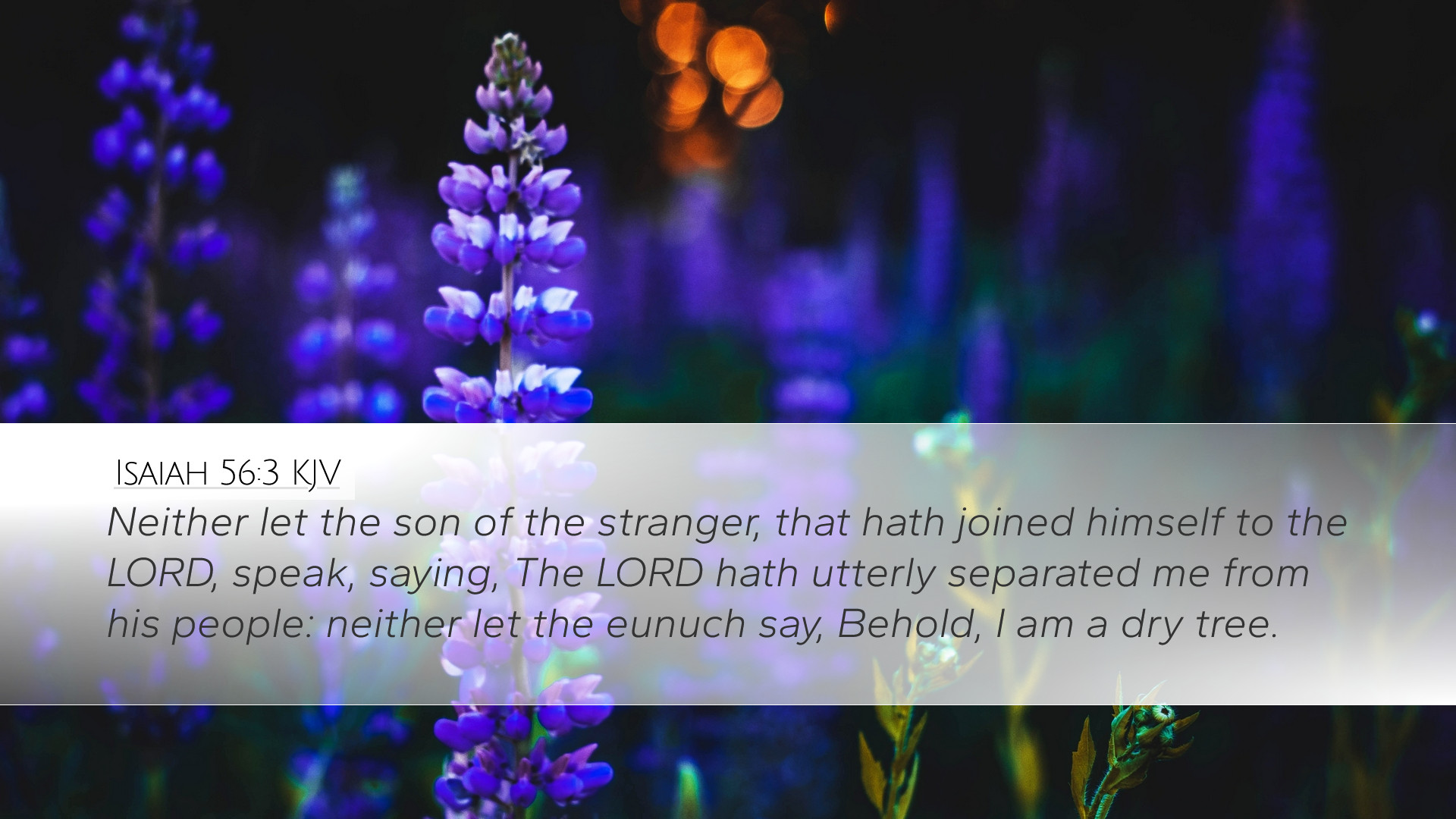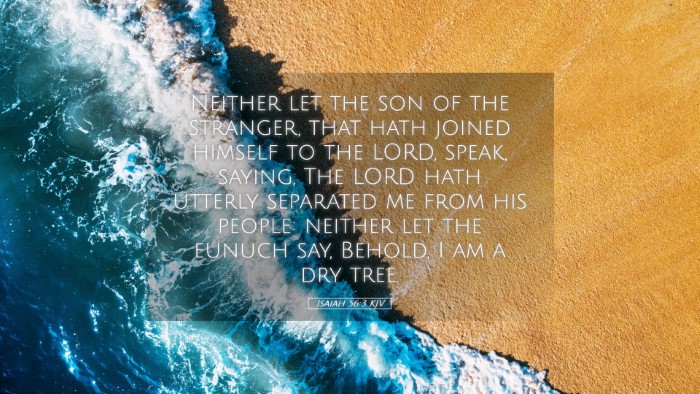Commentary on Isaiah 56:3
"Neither let the son of the stranger, that hath joined himself to the LORD, speak, saying, The LORD hath utterly separated me from his people: neither let the eunuch say, Behold, I am a dry tree."
Introduction
This verse from Isaiah encapsulates the profound inclusivity of God's covenant and the offer of salvation, extending beyond the boundaries traditionally observed by Israel. The prophetic tone of Isaiah emphasizes the Lord's willingness to embrace those deemed outsiders—"the son of the stranger" and "the eunuch." This commentary synthesizes insights from renowned public domain commentaries, providing a rich exploration for pastors, theologians, and students of the Bible.
Contextual Background
The Book of Isaiah is a tapestry of prophetic messages, spanning judgments against Israel and the promise of restoration. In chapters 56-66, a shift towards hope and acceptance is made, focusing on the future of God's people and the expansion of His mercy. The context indicates a post-exilic community yearning for identity and belonging, which is crucial when interpreting this verse.
Meaning of "the son of the stranger"
In biblical terminology, "the son of the stranger" refers to Gentiles—those outside of Israel's covenant community. Matthew Henry notes that these individuals, upon joining themselves to the Lord, should not assume that their background disqualifies them from God's grace. Rather, they are invited to participate in the promises of God.
- Spiritual Inclusion: Albert Barnes elaborates on the significance of integration into the covenant. He emphasizes that this inclusivity redefines societal boundaries, affirming that faith, rather than lineage, is the basis for belonging.
Understanding Eunuchs in Scripture
The mention of "eunuchs" in this verse reflects a group often marginalized in ancient Israel. Adam Clarke explains that traditionally eunuchs were viewed with suspicion due to their inability to produce descendants. Yet, the prophet declares that their status does not exempt them from God's love and purpose.
- Symbol of Spiritual Barrenness: Eunuchs are often seen as a metaphor for spiritual barrenness in the society of that time. Yet, God's message counters this perception, suggesting that true fruitfulness is found in devotion and faithfulness to Him.
- Assurance of Acceptance: The assurance given to eunuchs is profound, as it reflects God's intention to value faith over physical attributes or societal acceptance.
Key Themes
Several pivotal themes emerge from Isaiah 56:3, which should resonate with readers:
- Inclusivity of God's Covenant: God's promise extends to all who seek Him, dismantling barriers that separate individuals from His community.
- Hope and Restoration: The post-exilic context serves as a reminder that God's people can hold onto hope, regardless of their past or present circumstances.
- Value of Identity in Christ: True identity is rooted not in societal labels but in a relationship with God. This is an enduring lesson for contemporary believers.
Practical Applications for Pastors and Teachers
As leaders, ministers, and educators, there are several practical applications derived from this passage:
- Embrace Diversity: Foster communities that celebrate the diversity of God's creation. Make the church a place of inclusion where everyone, regardless of background, feels welcomed.
- Focus on the Heart: Teaching should emphasize that God looks at the heart (1 Samuel 16:7), rather than outward appearances or past failures.
- Encourage Faithful Living: Encourage congregations to live out their faith in ways that reflect God's love and acceptance, reassuring those who feel marginalized.
Theological Reflections
Theologically, Isaiah 56:3 presents rich reflections for ongoing discussion:
- Nature of God’s Grace: God’s grace is radical in its scope, challenging believers to reconsider who is "other" and how they can embody Christ's love.
- Prophetic Literature's Role: Consider the role of prophetic literature in shaping communal identity and moral vision, urging a return to authentic relationships with God.
- Future Promise of Acceptance: This scripture points forward to the New Testament understanding of inclusion in Christ (Galatians 3:28), emphasizing the timeless nature of God’s promises.
Conclusion
Isaiah 56:3 is a call to embrace the breadth and depth of God’s mercy. As we reflect upon this verse, we realize that every individual, regardless of their background or status, is invited into communion with God. This passage serves as both comfort and challenge, reminding us of our mission to extend the welcome of God to all whom we encounter, embodying His love in our communities.


